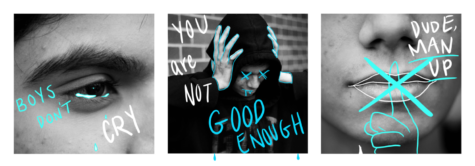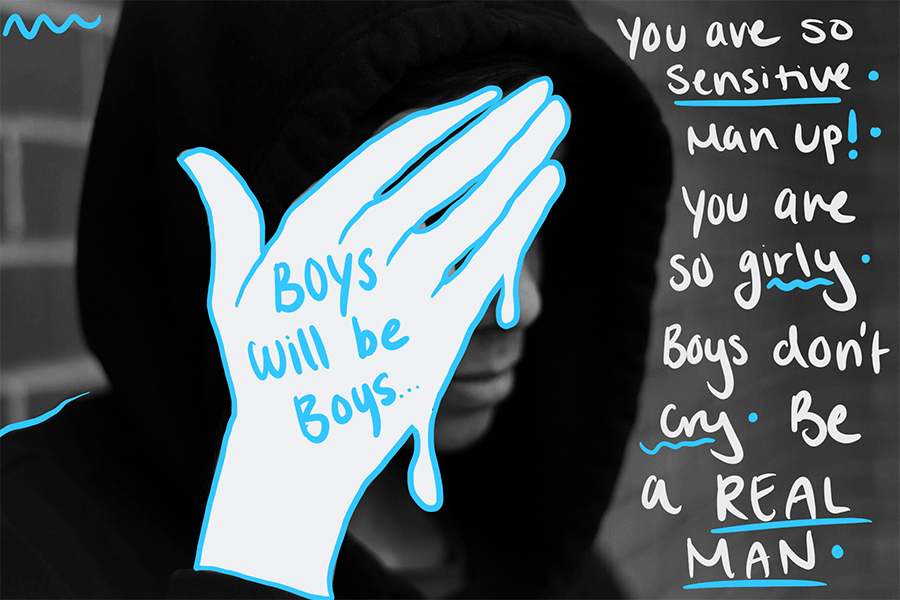Dear “Real Man”:
How does it feel like to show emotion?
From an early age, boys have been instructed to suppress their emotions and fit into a shrinking male stereotype. The Sidekick staff writer Yash Ravula joins the conversation by discussing the growing issue of toxic masculinity in a currently male-dominated society.
December 4, 2019
“You don’t look like your age at all!” is one of the most awkward comments when you are short. Standing at about five feet, four and a half inches and very skinny with a prepubescent-looking face, it has been a part of all the family get-together conversations since I can remember.
This is toxic masculinity being imposed on a child, and it happens far more often than people think. Toxic masculinity is present in many forms: holding back emotions, male beauty standards and the way men are expected to treat others.
Throughout history, we’ve seen a male-dominated society in which men were big, strong knights and ladies swoon around them. Anyone who wasn’t anything like that was considered an outlier. This mentality got ingrained into the minds of men, which got worse and worse throughout the years. Coppell High School senior Kai Martin shares a similar experience about being raised as the “man of the house.”
“I’ve been raised to not show emotions and be more independent. Which affected me a lot because I find it hard to express my feelings, and it makes it hard to change the way I’ve been taught all my life,” Martin said.
Over the past decade, many influencers such as Lizzo and Gigi Hadid have come forward to shed some light on what women’s beauty standards are and should be, and have started campaigns against the modeling industry for body shaming. When I was looking for statistics about the number of people who have come forward about body shaming in the male modeling industry, I could not find any.
“I am not surprised guys didn’t make any campaigns against [male modeling industry],” Martin said.
What appears in magazines has defined what a man looks like for generations. These magazines have little to no diversity. They are almost always white, flawless and extremely fit. Boys and men reading these magazines get a false sense of what people consider “manly” and “hot”; this can lead to issues such as body dysmorphia, which causes devastating eating disorders.

One of the emerging male voices in this conversation is “Jane the Virgin” actor, Justin Baldoni.
“I’m tired of being man enough for everyone all the time… I’m just a guy who realized after living for 30 years, I’ve been living in a state of conflict; conflict with who I feel like I am at the core, and conflict with who the world tells me as a man I should be,” Baldoni said at the TED Women’s conference in New Orleans.
He explains about being mad at his father for not teaching him to be like other guys and explains how men can be more “feminine” by talking to the women in their lives and not by talking over them.
I remember in third grade, I saw boys being aggressive and rude to girls. Even though I strongly disliked what they were doing, I felt as if I had to follow their lead. Some may argue, “That’s what they do” or “Boys will be boys.”
This mentality is one of the many ways adults impose gender stereotypes into little vulnerable children. According to psychologists, this prompts students to construct gender stereotypes. Instead of parents and teachers encouraging students by saying, “Boys will be boys,” one could teach students to be good human beings.
Teaching boys, while they are young to love and empathize, will give them the opportunity to be empathetic as adults, which could help them in their professional and personal relationships.
Although this habit will be hard for older men to adapt to, they should try and give it a chance rather than ridiculing it, and learn from the other genders and try to be vulnerable with other men. For those who are having a hard time being insecure about how they look, remember fitness does not equal beauty.
One of the things that make a person a “manly man” is being vulnerable and showing love and emotions.
Next family gathering, when someone tells me, “You look too young for people your age” or “you should eat more” and look at me weird, I have to own up to the fact that I am a five feet, four and a half inches; prepubescent-looking, average faced and very skinny boy, who is breaking stereotypes about what men look and think like.
Follow Yash (@YashRavula) and @CHSCampusNews on Twitter.














Bob Williams • Jul 30, 2020 at 9:06 pm
First let me say this is a excellent article and I hope that it is published far and wide. I believe that keeping an open mind in life is key to being a better human. We can’t all be put into the same box and we all can’t be what society says we should be. Having said that I love the sincerity of this article and the honesty. It’s enlightening and educational and can help many people understand that being differant or not fitting into a specific mold doesn’t make any of us and less manly than anyone else. In fact I would argue it makes us unique. Great article!
Laura • Dec 17, 2019 at 12:38 am
I love this story! This is all so true and I love how at end you bring it back to you as a new empowered man that does not need to prove anyone his worth. Great story
Yash Ravula • Dec 17, 2019 at 9:41 am
Thank you so much! I really think this a topic that is not spoken about a lot in the media. And is something I’m very passionate about
Camila Villarreal • Dec 15, 2019 at 2:10 pm
GREAT story Yash. Wow. Holy moly. Keep killin’ it : )
Victoria Hertel • Dec 6, 2019 at 8:23 pm
I love your story Yash. As soon as I saw your story on the home page I wanted to read it. I am so proud of you!
Ashwaq Cheema • Dec 6, 2019 at 6:07 am
Well thought out, and developed. Good job YASH.
Claire Clements • Dec 5, 2019 at 3:16 pm
This was really well-written Yash! Good job!
Charlotte Vanyo • Dec 5, 2019 at 9:11 am
Great story Yash, I’m so proud of everyone who worked on this piece. The visual media looks outstanding!